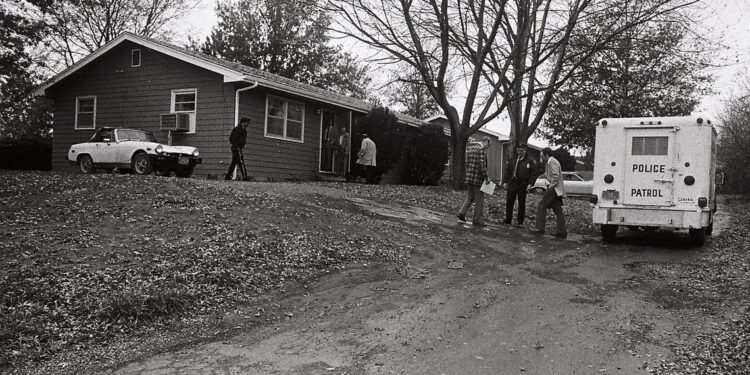The first thing Sandra “Sandy” Hemme did after walking out of prison in July 2024 — after spending 43 years behind bars — was visit her father. He was in the hospital battling kidney failure.
Ten days later, he was gone.
Hemme, now 65, had been held for a crime she said she didn’t commit — the 1980 murder of a woman in St. Joseph, about an hour north of Kansas City. In June 2024, a judge agreed. By then, she had lost decades with her parents, siblings and a young child.
Compounding the loss were the formidable obstacles Hemme faced while seeking to clear her name in Missouri, a state where legal and political systems often resist admitting error even in the face of overwhelming evidence. Missouri is unique in that it only allows direct innocence claims for those serving a death sentence. Even after the judge’s order freeing Hemme, officials from the Missouri Attorney General’s Office — known for aggressively opposing exonerations — fought to keep her imprisoned. Advocates say the state’s top leadership has been hesitant to meaningfully reform the systems that kept her behind bars.
Still, Hemme took solace in being present for her father’s final days.
“It was a relief,” Hemme told The Marshall Project – St. Louis in her only interview so far since being released. “A burden was lifted.”
She wishes she’d had more days with him.
Patricia Jeschke, a library secretary, was discovered bound and asphyxiated on her bedroom floor in St. Joseph on Nov. 13, 1980.
On Nov. 28, then-St. Joseph Police Department detective Steven Fueston visited Hemme at a state hospital where she was on antipsychotic medication, court documents show. Her name surfaced while he was investigating an unrelated disturbance. Hemme told Fueston she thought she caught a ride from Jeschke after leaving the hospital on Nov. 12 from a previous stay. Eventually, Fueston testified, he stopped questioning Hemme that day because “she didn’t seem totally coherent.”
He returned a half a dozen more times. Each time, her story changed. Fueston said he stopped pursuing Hemme as a lead because he felt he would not get the truth from her.
During an eighth interrogation with a different officer, Hemme confessed.
Meanwhile, evidence surfaced implicating another person who attempted to use a credit card belonging to Jeschke and was found with a pair of earrings that belonged to her. But that investigation came to a halt. Many close to the case believed it was because it was Michael Holman — a St. Joseph Police Department officer.
The police chief at the time even removed an investigator from the case after he concluded Holman, not Hemme, committed the killing.
A judge sentenced Hemme to life without parole after she pleaded guilty to killing Jeschke in April 1981. A new trial was ordered after Hemme withdrew her initial guilty plea, but she was convicted in a 1985 trial. This time, she was sentenced to life in prison without the possibility of parole for at least 50 years.
Hemme began contacting the Innocence Project around 2006. Officials said the organization took her case in 2018.
In 2023, her lawyers filed a 147-page petition in Livingston County Circuit Court detailing how they built their case. They were able to retrieve documents from the Jeschke murder case and on Holman from the St. Joseph Police Department that had not been previously disclosed. No physical evidence ever connected Hemme to the crime. Psychiatrist Judith Edersheim concluded in an evaluation that Hemme was at high risk for falsely confessing due to her serious mental illness and the antipsychotic medication she had been put on, which likely disrupted her cognitive thinking.
Sean O’Brien, a Kansas City-based attorney who represented Hemme alongside Innocence Project attorneys, called her case “a failure of everything,” including the St. Joseph police steering the investigation away from one of their own.
Because of the state’s stance that only those on death row can bring innocence claims before a court, Hemme’s attorneys alleged constitutional violations — including that police hid evidence of Holman as a better suspect and that her previous attorneys were ineffective. It worked.

A court exhibit photo showed the home where Patricia Jeschke, the victim, lived and was found.
“It’s not a claim that they can raise if they received any other sentence, life without parole or anything else,” Bay Scoggin, a state policy advocate with the Innocence Project, said of the state’s mandate that those seeking to be freed must be on death row to receive another trial.
The loophole dates back to 2003 when O’Brien was representing Joe Amrine, who was on death row. He was exonerated after the Missouri Supreme Court found clear and convincing evidence of his innocence. Subsequent cases were mostly denied if they lacked a death sentence, until a 2021 law allowed prosecutors to file motions when they believed someone was wrongfully convicted.


An FBI fingerprint report showed that Hemme’s fingerprints were not at the scene. Yellow highlighting added by The Marshall Project.
Changing the death penalty requirement could happen through action by the state Legislature or the Missouri Supreme Court, said former Chief Justice Michael Wolff, who spent 13 years on the court before retiring in 2011. The question was not brought before the court during his time, Wolff said.
Bipartisan bills proposed this year in Missouri’s General Assembly would allow someone in prison to bring an innocence claim before a judge, who would have the authority to vacate a conviction if convincing evidence supports a person’s innocence.
During a joint hearing on the measures, officials from Missouri Attorney General Andrew Bailey’s office voiced opposition.
“This bill undermines the rule of law and is a miscarriage of justice,” First Assistant Attorney General Jay Atkins said during heated testimony in February before the Judiciary Committee. “And what’s worse is, it’s doing it on the backs of victims.”
Rep. David Tyson Smith asked if reviewing some cases that turned out to be frivolous was worth it if the bill freed an innocent person.
“You represent the attorney general, and you’re talking about people who could potentially be innocent, and you’re coming in here in almost a hostile manner talking about miscarriage of justice,” Smith said. “Frankly, I find that’s disgusting, especially if there’s people who are actually innocent.”
Hemme faced similar resistance by the Attorney General’s Office throughout her case. But in June 2024, Circuit Judge Ryan Horsman declared in a 118-page order that she was “the victim of a manifest injustice.” He added that the evidence directly tied Holman, who died in 2015, to the murder.
Horsman ordered her release on July 9. She walked free 10 days later, delayed by interference from the Attorney General’s Office, including officials unsuccessfully filing paperwork to deny the decision and calling the warden to block her release.
The attorney general’s resistance to Hemme’s innocence case did not come as a surprise to many on the opposing side. The office has a track record of disputing wrongful conviction claims, even when evidence casts serious doubt on a verdict. That stance has endured under previous leaders from both political parties.
A spokesman for the office said Bailey and assistant attorneys general who worked on Hemme’s case were not available for an interview.
Megan Crane, co-director of the MacArthur Justice Center, a nonprofit civil rights firm, said it seems like the Missouri Attorney General’s Office “prioritizes finality over fairness.”
Nicole Gorovsky, a St. Louis attorney who worked in the office’s appellate division from 2001 to 2003 under Democratic Gov. Jay Nixon, said she took the special rules for prosecutors seriously.
“The underlying principles are prosecutors are to seek justice, not a win,” she said.
But she agrees that more recent attorneys general in Missouri have fought innocence claims across the board.
Quinn O’Brien, an investigator who worked on Hemme’s case with the Innocence Project, said she believes the perspective in the Attorney General’s Office “really is that it is OK to keep an innocent person in prison or execute an innocent person because they’re protecting the rule of law.”
Questions about the guilt of a man on death row came to a head during court proceedings in St. Louis County in 2024. Marcellus “Khaliifah” Williams argued that his DNA was not on the knife used in a 1998 murder. When local prosecutors intervened on his behalf and pushed to have him re-sentenced to life without parole, officials from the attorney general’s office stepped in to block the deal. Williams was executed on Sept. 24.
Bailey was elected to a second term in November. Since then, he has continued fighting wrongful convictions, including an open appeal in Christopher Dunn’s case asking the Missouri Supreme Court whether the attorney general’s office can fight the decision that vacated Dunn’s 1991 conviction. His release in 2024, like Hemme’s, was temporarily delayed after Bailey’s office intervened to block it.
Hemme recalled walking out of Chillicothe Correctional Center in northwest Missouri.
“I tell you what, I was so lightheaded. I felt so light that it was hard to explain,” she told The Marshall Project – St. Louis. “I felt like I was flying through air. It was so great.”
She said she spent her first months home catching up with relatives and taking life slow and easy. She also continued fighting her case.
In October, she made the trip to Kansas City for a Court of Appeals case brought by the attorney general’s office. Attorneys alleged the judge who set Hemme free had exceeded his authority. She calmly watched from the gallery as the judges listened to the evidence.
The panel struck down the appeal, clearing the path for Hemme’s official exoneration, which came in December.
Despite all that she has lost, Hemme quips that she is “blessed by the best and not tripping on the rest.” For now, she has been living with her sister and brother-in-law in Higginsville, a town of about 5,000 people about 45 minutes east of Kansas City.
Eventually, she wants a place of her own.
She is ineligible for Social Security, having spent the majority of her working years in prison. A law signed by Gov. Mike Kehoe on March 26 makes her eligible for $176 for every day of wrongful incarceration. It repeals a provision that only those who prove their innocence through DNA testing qualify for payment. Under the new law, Hemme would have to give up her right to sue the state for damages and, because payments are capped at $65,000 a year, she would have to live into her 100s to recoup what she would be owed.
Hemme has been able to enjoy normal, everyday facets of life: celebrating Thanksgiving and Christmas, cheering on her Kansas City Chiefs and attending church on Sundays. Her faith, she said, is something that has always been important to her. She has also savored time with her mom, who lives a couple of towns over, and playing with her family’s dog, Lucky.


Hemme has been living with her sister and brother-in-law in Higginsville, a town of about 5,000 people in north-central Missouri.
The colder winter months were more difficult because she was often stuck inside. She likes being outside and being able to take little walks.
“It feels good to get out there and stretch,” she said, adding that even going outdoors while in custody was stressful because so many people were always around.
She’s becoming acquainted with new technology — like her smartphone, tablet and email — and making new friends during activities like bingo at the local senior center. On a recent Tuesday, participants marked off their cards as they chatted about families around town and local restaurants, some of which were unfamiliar to Hemme. She was pleased when she got to go up to a table of prizes after winning a round, picking out a small blue and white checkered quilt.
In late February, she turned 65.
For many, it’s a milestone that signifies the end of a career. Hemme, though, is in the throes of quiet beginnings. She spent the day with a friend she made from the senior center, and her sister baked an angel food cake that evening. That weekend, her adult granddaughter took her out to eat. Hemme enjoyed a hamburger and onion rings.
One thing that still weighs on her: Other potentially innocent women remaining in prison.
Hemme is one of 56 people who have been exonerated in Missouri since 1991, according to the National Registry of Exonerations. They lost upwards of 780 years of freedom collectively.
“I hope people keep fighting for them,” she said.



























